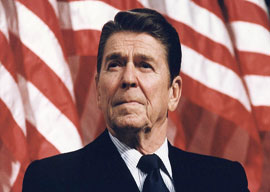
December 10, 2013

President Ronald Reagan
“Apartheid is an affront to human rights and human dignity. Normal and friendly relations cannot exist between the United States and South Africa until it becomes a dead policy. Americans are of one mind and one heart on this issue.”
So said Ronald Reagan in his 1986 message to Congress vetoing the “sweeping and punitive sanctions” Congress was seeking to impose.
Reagan equated the sanctions to “declaring economic warfare on the people of South Africa.”
His Treasury Secretary James Baker said Sunday that Reagan likely regretted this veto. But having worked with the president on his veto message and address on South Africa, I never heard a word of regret.
Nor should there have been any.
For in declaring, “we must stay and build not cut and run” from South Africa, Reagan, whose first duty was the defense of his nation in the Cold War with the Soviet empire, saw not only the moral issue but the strategic imperative.
In 1986, there were 40,000 Cuban troops in Angola, where South Africa was a fighting ally and backer of anti-Communist Jonas Savimbi.
In Zimbabwe, Robert “Comrade Bob” Mugabe, having butchered thousands of Ndebele of rival Joshua Nkomo, was communizing his country. Southwest Africa and Mozambique hung in the balance.
Reagan was determined to block Moscow’s drive to the Cape of Good Hope. And in that struggle State President P. W. Botha was an ally.
Second, as Reagan declared, the sanctions ban on sugar imports would imperil 23,000 black farmers, and cutting off Western purchases of natural resources would imperil the jobs of 500,000 black miners.
“The Prime Minister of Great Britain has denounced punitive sanctions as immoral and utterly repugnant,” said Reagan in July of 1986, “Mrs. Thatcher is right.”
“Are we truly helping the black people of South Africa—the lifelong victims of apartheid,” said Reagan in his veto, “when we throw them out of work and leave them and their families jobless and hungry in those segregated townships? Or are we simply assuming a moral posture at the expense of the people in whose name we presume to act?”
Zulu Chief Mangosuthu Buthelezi had come to see Reagan to implore him to block sanctions, as they would harm his people.
Alan Paton, author of “Cry the Beloved Country,” the conscience of South Africa, wrote:
“I am totally opposed to disinvestment … primarily for a moral reason. Those who will pay most grievously for disinvestment will be the black workers of South Africa. I take very seriously the teachings of the Gospels, in particular the parables about giving drink to the thirsty and the food to the hungry. I will not help to cause any such suffering to any black person.”
“Nor will we,” declared Reagan.
He cited an African leader who described South Africa as a zebra: “If the white parts are injured, the black parts will die, too.”